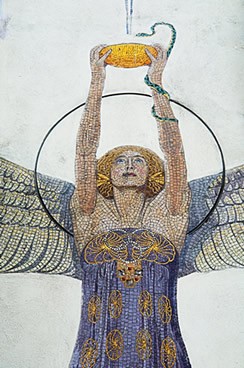Why being yourself matters
Why being yourself matters
“The opposite of courage in our society is not cowardice…it is conformity.”
~ Rollo May, Man’s Search for Himself.
~ Rollo May, Man’s Search for Himself.

There will never be anyone else like you in the future of the universe. There has never been anyone exactly like you since human life began. That’s why being yourself is more important than anything else; certainly more than the fear that traps people into conforming.
Non-conformists have always had a rough time. Society seems to need and fear them in roughly equal measure. As a person who was a teenager in the “swinging 60s,” I’ve seen a gray tide of conservatism flow back steadily to reclaim nearly all the ground it lost during that decade. Is this an advantage? If it is, I can’t see it. But that’s how life works: two steps forward, followed by one-and-a-half back as those who lost their power try to reverse the process.
The forces of the status quo—of conformity—have been strong again in recent years. Maybe that’s behind an upsurge in interest in self-development. When the outside world is intent on forcing you into a bland, acceptable mold, people naturally turn elsewhere to find an outlet for what matters most: their own uniqueness.
Adding some spice to life
Adding some spice to life
Even the Bible says it. Jesus urged his followers to be like salt; to spice up the world with new ideas. He didn’t tell them to keep their heads down and do whatever their “betters” amongst the Romans and the Pharisees told them. You don’t start a new religion by fitting in. Today’s religious leaders are nearly all arch-conservatives, so we forget what radical non-conformists people like the Buddha, Jesus, and Mohammed were during their lives. Jesus wasn’t put to death for doing what the leaders of the society of his day approved of, was he?
Those who benefit most from the status quo are naturally the least interested in change, and they find allies in the fearful and the authoritarian. In the quotation at the head of this article, Rollo May suggests conformity is due to lack of courage. He certainly had a point. Many people suppress their ideas, hopes, and dreams because they’re afraid to stand out and draw attention to themselves. Conformity always includes a threat of punishment if you fail to fit in, whether it comes from ridicule, being shunned by others, or direct attack. Those who seek conformity have never been afraid to back up their wishes with force.
Conformity implies a fundamental mistrust of others
I believe there’s a more fundamental power behind the urgency with which authoritarian conservatives seek to suppress individuality. That power is lack of trust. Wise leaders and outstanding thinkers are alike in two things: they’re usually non-conformists on an epic scale—and they display a deep trust in the basic goodness, intelligence, and capacity for development of their fellow human beings.
In stark contrast, the most determined proponents of conformity have always been dictatorships. Under a dictatorship, any kind of variation from prescribed ways of thinking or acting is punished. Eccentrics of all kinds are weeded out. Nothing is permissible save blind adherence to the dictator’s edicts.
Conservative thinkers often suggest too much freedom will lead to anarchy and the collapse of all standards. Since they cannot trust others to behave reasonably, they always want more rules. Yet a dictatorship is exactly what you get when the ideas and standards of one group are enforced everywhere by the rule of law. Whether it’s a nation or a business, a dictatorship suppresses creativity, individuality, and freedom in the cause of “preventing license.”
If you can’t trust yourself, why should others trust you?
Being who and what you are is the most natural thing there is. To suppress it, whether through fear, yielding to social pressure, or lack of confidence always leads to trouble. That’s why millions of people today lead lives of frustration and desperation. They denied who they are in the hope that the powers that be would reward them. Their reward was mediocrity, depression and a nagging sense that life like that is scarcely worth living.
There may be a cost. Some people, even some friends, will disapprove of you as you truly are and will let you know it. There will be setbacks along the way. Yet the price for being yourself can never be as great as the price you will pay for stepping aside from your basic nature: a price paid in frustration, dissatisfaction, and the hopeless realization of all that you might have been, but now can never attain. The English poet A.E. Housman, a closet homosexual who lived a life of outward conformity and lonely respectability, expressed something of the idea like this:
Into my heart an air that kills
From yon far country blows:
What are those blue remembered hills,
What spires, what farms are those?That is the land of lost content,
I see it shining plain,
The happy highways where I went
And cannot come again.
Take up the challenge. Be whatever nature designed you to be. Never mind whether you face disapproval from those who lack the courage to follow the same route.
Conformity has very little to recommend it. Trust yourself and trust others. Our world has so little trust even a little more is precious. If you can’t trust who you are—the naturally valuable, curious, interesting, and exciting person you were born to be—why should anyone else trust you?
Mediocrity and inner frustration are the true price of conforming. Only those with the courage openly to live their dreams can ever hope to find lasting satisfaction with their lives.

Comments
Post a Comment